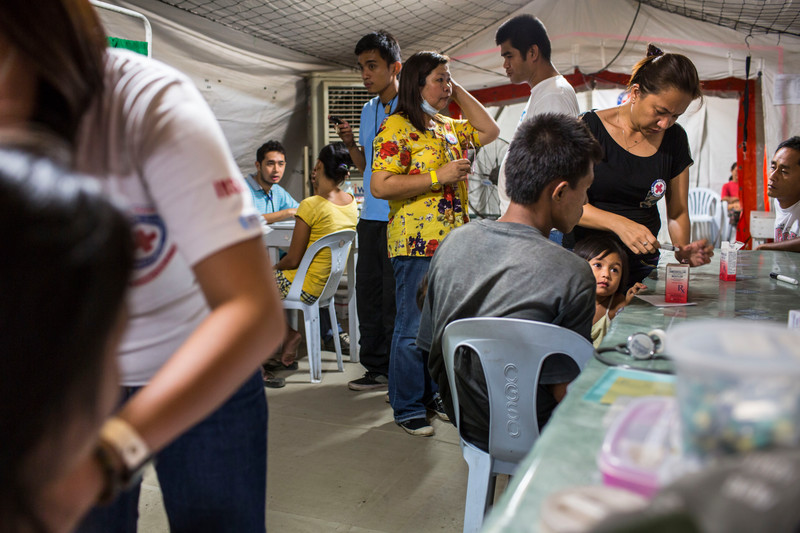
Spotlight
A selection of news from across the Federation

IPPF Statement on the 68th session of the Commission on the Status of Women (CSW)
IPPF welcomes the agreed conclusions of the 68th session of the Commission on the Status of Women (CSW), on the theme of “Accelerating the achievement of gender equality and the empowerment of all women and girls by addressing poverty and strengthening institutions and financing with a gender perspective”. IPPF actively engaged in the process by providing technical inputs to Member States, raising awareness about the interlinkages between SRHR, poverty, gender equality and the empowerment and human rights of all women and girls.
Filter our news by:


| 01 December 2023
IPPF marks World AIDS Day by announcing the launch of a special program to roll out new biomedical HIV prevention methods
IPPF provides comprehensive sexual and reproductive health care to clients around the world. HIV testing, prevention, and treatment services are essential parts of our integrated sexual and reproductive health care package. To expand the choices individuals have to protect themselves from HIV, IPPF is excited to announce a special program to provide the newest methods of HIV prevention - injectable PrEP (a 2-monthly injection of cabotegravir-LA) and the vaginal ring (a monthly vaginal ring of dapivirine), as well as expanding where oral PrEP is offered. This program is being launched through a consortium of IPPF Member Associations called the Consortium to Advance Access to new HIV Prevention Products (CAAPP) - led by Family Planning Association of India, and including the Family Life Association of Eswatini, Lesotho Planned Parenthood Association, Family Planning Association of Malawi, Federation of Reproductive Health Associations, Malaysia, Family Planning Association of Nepal, and Planned Parenthood Association of Thailand. We hope this program will increase access to the number of ways people can protect themselves from HIV, supporting individual's choice to find an HIV prevention method that works for them.

| 20 March 2020
IPPF welcomes the ruling to extend abortion care from 20 weeks to 24 weeks in India
The MTP (Amendment) Bill, 2020 passed by the Lok Sabha (Lower House of Parliament) has indeed been a momentous victory for women and girls of India. The celebrations are incomplete without recognising the tireless efforts of Family Planning Association of India (FPAI) and all the Civil Society partners, activists and women who never stopped demanding women’s rights to safe and legal abortions. IPPF applauds the Cabinet on this landmark decision which approved the bill allowing abortion up to 24 weeks. The Bill allows abortion up to 24 weeks of gestational age for vulnerable categories of women including rape survivors, victims of incest, pregnancies with foetal abnormalities and minors. Replacing the term’ married couple’ to woman and her partner highlights that the government is acknowledging the changing social fabric in the country. It also takes a positive step towards ensuring confidentiality of information for the woman, except to a person authorised in any law which is in force. The Bill can now be said to be truly woman-centric which recognizes and respects a woman’s autonomy, her choice and her rights. Dr Kalpana Apte (Secretary General, Family Planning Association of India) said: “It was a very long battle that we have fought along with other CSOs and women groups. Although, the amendments are not fully what we fought for, we are happy with many achievements. The gestation age is expanded, now unmarried women can access safe abortions and reduction in numbers of specialists required for second trimester are some of the important wins. The battle is indeed won, the fight is still on to ensure women's sexual and reproductive rights are supported and protected through enabling legislation!” IPPF Director-General Dr Alvaro Bermejo added: “This bill passing represents a huge shift for the rights of women in India to access safe abortion care- though there is more work to be done. This win would have not been possible without the hardwork and dedication of the Family Planning Association of India, civil society partners and activist. Let this win in India inspire other organizations and activists to continue their fight for safe and legal abortion.” While the increase in gestational limit is only for “vulnerable categories of women”, there is a need to improve accessibility to abortion service for all women who want/need it. In addition to addressing stigma, a key requirement is to increase access to safe abortion services in India – in each and every part of the country women get high quality, dignified and stigma free abortion services, only then we can claim universal health coverage for all.

| 06 September 2018
IPPF welcomes India’s Supreme Court historic decision to free LGBTI communities from persecution
After generations of oppression under a colonial-era law, today the LGBTI community in India celebrated the scrapping of key provisions in Section 377 from the Indian Penal Code, which had previously outlawed consensual same-sex sexual relations. Following multiple legal challenges, the Supreme Court finally recognised that “158 years ago, the law deprived people of love”, and ruled that all people should be free from prejudice and persecution. A historic win for communities that have been pushed into the shadows, Chief Justice Dipak Mishra made it clear that “any discrimination on basis of sexual orientation amounts to a violation of fundamental rights.” Welcoming this ruling, IPPF Director-General Dr Alvaro Bermejo said: “Today is a historical victory for the LGBTI community in India. No longer will their human right to love, and to show that love, be violated by archaic laws. IPPF hopes that is this the first step of many to ensure that the LGBTI community are guaranteed their full fundamental rights and that social, economical, financial cultural and political inclusion of the LGBTI community becomes woven into the fabric of India’s national identity. Today's decision will bring new-found hope and energy to those LGBTI communities that are still suffering under repressive laws. I would like to thank the individuals and organizations that have fought tirelessly to make this happen. Without people fighting for change, change cannot happen.” Image by Courtesy Photo

| 20 October 2016
Urgent appeal: Typhoon Haima strikes the Philippines
Another dangerous tropical cyclone has emerged in the Pacific Ocean. The Typhoon Haima hit the northern part of the Philippines and considering the strength of the storm this cyclone will have had a high humanitarian impact. Please make a donation now. As of reporting time, a total of 18,157 families (90,589 individuals) were evacuated. Initial reports from the Cordillera Region show that 113 houses were damaged. With the strength and extent of the destruction, it is most likely that health and birthing facilities and schools were severely affected. In the rush to provide shelter and food in a crisis, the health and protection needs of pregnant women and young families are often overlooked. When the Typhoon struck approximately one in five women will have been pregnant. Without access to the right health care, we expect 20 per cent of them will incur complications during the delivery. Your donation will help us save lives. Having established partnerships in 170 countries, IPPF is one of the first responders when a crisis occurs. Helping the hardest-to-reach areas, particularly women and girls, we are often the only health providers there. The International Planned Parenthood Federation, working through the Family Planning Organization of the Philippines (FPOP), is responding to this crisis. We have worked together since 1969 and in recent years we have saved countless lives following Typhoon Haikui, Bopha, Trami and Haiyan. FPOP is working closely with the local government and international relief agencies to ensure that no women or her family is left behind and put at risk during this crisis. Nandy Senoc, FPOP’s Executive Director said “While we don’t yet know the full extent to the devastation, we are mobilizing our health workers and volunteers, to provide lifesaving services. As a volunteer organization, we are there before, during and after the crisis strikes. We are ready to respond now. For many women and girls in these affected areas, access to our essential health and protection services could mean the difference between life and death. I would like to thank you for supporting IPPF’s work and for standing by women and girls during difficult times like this. Your generosity today will help us support more women and girls as this crisis unfolds." With your support we reach over 2.2 million clients in crisis settings annually in all corners of the world.

| 02 August 2016
IPPF-SPRINT provides humanitarian assistance in conflict affected areas of North Cotabato, Philippines
Aug 2, 2016: New Delhi: Manila: The International Planned Parenthood Federation through its humanitarian wing, the SPRINT Initiative, is providing humanitarian assistance in the conflict-affected areas of Cotabato in the Philippines. The armed conflict between the Government of the Philippines (GPH) and the secessionist Moro Islamic Liberation Front (MILF) has lasted for more than five decades and has displaced around a million people in central Mindanao, Philippines. According to reports dated April 2016, the armed conflict has escalated, creating concerns over a protracted crisis and the vulnerability of women and girls. The conflict has internally displaced farmers who are living in the hinterland communities of the province of North Cotabato, namely in the municipalities of Makilala, Magpet, Kabacan and Tulunan. The SPRINT Initiative project will reach out to 25 affected villages or barangays located in geographically isolated and depressed areas, thereby making access to healthcare an extremely rare thing. As per the assessments done by IPPF’s East and South East Asia and Oceania Region office’s (ESEAOR) Member Association, the Family Planning Association of Philippines (FPOP), access to Sexual and Reproductive Health (SRH) services in these villages is very limited. “IPPF-SPRINT and FPOP will coordinate the implementation of this project with (the) UNFPA centre in Mindanao throughout the 4-month period from August to November, 2016. The Minimum Initial Service Package (MISP) will be implemented on-the-ground. IPPF-SPRINT will reach out to around 15,000 beneficiaries in the area and will provide crucial and life-saving SRH services. An amount of AUD 50,000 has been mobilised for the response,” said Aditi Ghosh, Director, IPPF-SPRINT. This humanitarian response is being funded by the Department of Foreign Affairs and Trade (DFAT) under the Australian government. “FPOP is a part of the UN cluster system, particularly Health and Protection clusters in the national level. FPOP will also coordinate the humanitarian response with UN regional centres covering affected areas. The North Cotabato Provincial Disaster Risk Reduction and Management Council (DRRMC) will also play a key role in implementing the MISP,” said Nora Murat, Regional Director, IPPF-ESEAOR. IPPF-SPRINT will work on prevention and management of the consequences of sexual violence, reduction of sexually transmitted infections (STIs) including HIV transmission, prevention of excess maternal and neonatal mortality and morbidity, plan for the provision of comprehensive SRH services and integrate into primary health care as the situation permits. Apart from the above, orientation on MISP and Risk Management for implementing partners and project staff/volunteers will be undertaken. Contact info: Murali Kunduru: [email protected] Jayamalar Samuel: [email protected] Media Contact: Rhea Chawla: [email protected] www.ippf-sprint.org The SPRINT Initiative is a Sexual and Reproductive Health (SRH) Programme in Crisis and Post-Crisis Situations. SPRINT ensures access to essential lifesaving SRH services for women, men and children in times of crises, a time when services are most needed yet are not prioritised or recognised by key humanitarian responders. The SPRINT Initiative saves lives and delivers on behalf of the Australian Government aid program (DFAT: Department of Foreign Affairs and Trade), which aims to provide more effective preparedness for and response to disasters and crises. The Initiative is managed by the International Planned Parenthood Federation (IPPF) and represents its commitment to increasing access to SRH services for crisis-affected populations. The International Planned Parenthood Federation is a global service provider and a leading advocate of sexual and reproductive health and rights for all. It is a worldwide movement of national organisations working with and for communities and individuals.













